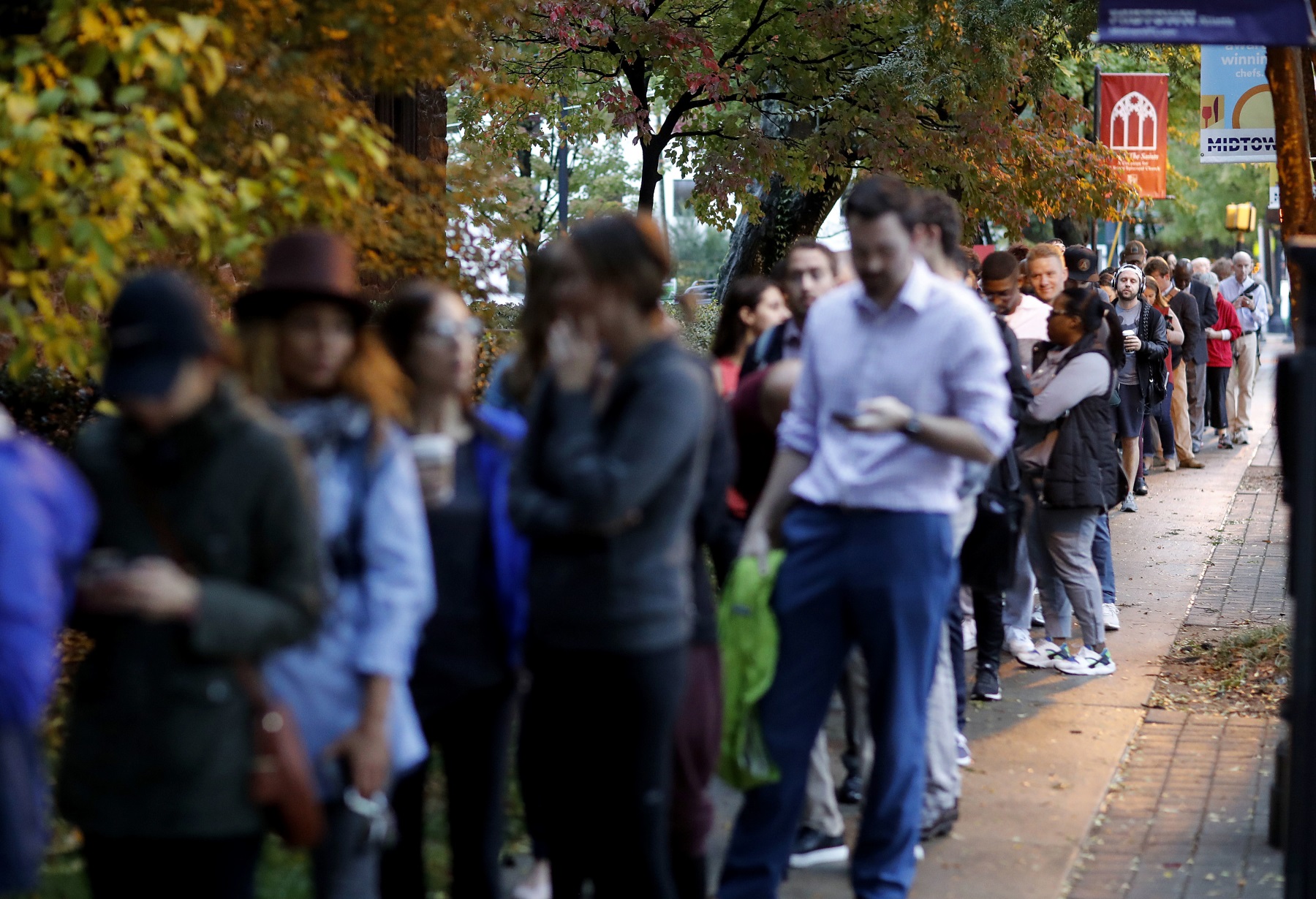New Georgia Secretary Of State Faces ‘Full Plate’ Of Voter Worries

A line forms outside a polling site on Election Day in Atlanta on Nov. 6. Perhaps the biggest challenge Brad Raffensperger will face as secretary of state: restoring the rattled confidence of Georgia voters.
David Goldman / Associated Press file
The Republican elected to oversee Georgia’s elections for the next four years will inherit an office tasked with replacing the state’s aging electronic voting machines, ensuring security flaws that exposed voters’ personal information to potential hacks have been patched and dealing with several lawsuits that allege voter suppression marred the 2018 midterms.
“We are moving forward as fast as we can,” Brad Raffensperger said Wednesday, acknowledging the big workload he faces as Georgia’s next secretary of state. “It’s a full plate.”
The Republican state lawmaker won a runoff election Tuesday to become the state’s new elections chief, defeating former Democratic congressman John Barrow.
Their race gained unusual attention after GOP Gov.-elect Brian Kemp, who stepped down as secretary of state the day after the November election, was loudly criticized by Democrats for overseeing his own election and accused of suppressing votes to improve his odds of winning — allegations Kemp strongly denies.
Perhaps the biggest challenge Raffensperger will face: restoring the rattled confidence of Georgia voters.
“I think this election brought a lot of, I guess you could say, the underbelly of elections into the light,” said Cathy Cox, a Democrat who served as secretary of state from 1999 through 2007 and is now the dean of Mercer University’s law school.
A federal judge scolded state elections officials ahead of November for failing to replace paperless electronic voting machines despite experts’ warnings that they’re vulnerable to hacking. Meanwhile, the secretary of state’s office has faced criticism at least three times since 2015 for security breaches that risked exposing information on millions of Georgia voters.
A sweeping lawsuit filed after the election by Fair Fight Action, a nonprofit backed by Democratic gubernatorial nominee Stacey Abrams, alleges broad violations of citizens’ rights and asks that Georgia be required to get a federal judge’s approval before enacting any voting rules to ensure that the change won’t disenfranchise minorities. Other pending lawsuits challenge Georgia’s rejection of absentee ballots with signatures that don’t match those on file or when certain information is missing or inaccurate.
Voters at some Georgia precincts also faced wait times of two hours or more Nov. 6 as the state saw record turnout for a non-presidential election. Even Kemp had problems with his voting card when he tried to cast his ballot, though the issue was fixed quickly.
In a phone interview Wednesday, Raffensperger said he hopes to get state lawmakers to approve and fund a new, more secure voting system in time for Georgia’s municipal elections next fall. That would allow election officials and voters to try out the new system before the presidential primaries in 2020.
As for problems voters encountered at the polls this year, Raffensperger said they seem to have been “rather minor” overall and largely were caused by glitches by election officials at the county level. Like Kemp, he fiercely denied arguments that officials tried to dampen turnout among poor and minority voters, citing record turnout last month and big increases in voter registration.
“There was no concerted effort of any suppression whatsoever,” Raffensperger said, adding he would be open to a review of “what went right and what went wrong” with the election.
Asked how he plans to restore confidence in voters worried about the fairness and integrity of elections, he said a new voting system that’s “cyber-secure” and has an auditable paper trail should go a long way.
“I think that’s going to give voters confidence their ballot never changed after it left their hands,” Raffensperger said.
Cox said she also suspects many of Georgia’s voting problems this year were “unintentional and might even border on negligence,” as opposed to being efforts at outright suppression.
She said some issues could be easily be remedied, such as what she called an outdated requirement that voters write their birthdate on the outside of the envelopes used for mail-in absentee ballots.
Regardless of intentions, voters’ faith in elections has been shaken since at least the 2016 presidential campaign as candidates’ rhetoric has increasingly cast doubt on the fairness of the system, said Charles Bullock, a political science professor at the University of Georgia.
“This year in Georgia it’s been Democrats saying there’s something wrong with the system and you can’t trust it. But two years ago who was saying it? Donald Trump,” Bullock said. “We’ve gotten to some degree where both sides are saying our electoral system cannot be trusted. And that’s kind of a bad message to be putting out.”








